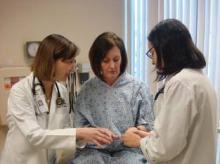Dr. Gravallese has touched the lives and careers of many young rheumatologists in training and they still recall the experience as being fundamental to shaping their lives.
The guys in her family have done more than prepare her for departmental uproar. They have opened her eyes to a pleasure she had been unaware of, at least in a meaningful way, even though she spent most of her life in the greater Boston area. These days, "I am indeed a Red Sox fan. Before I had my two boys I paid no attention to sports. But, as the years went on, I found that the more I heard about baseball from them, the more fascinating it became. Both of my boys are avid sports fans, as is my husband – and all three played baseball."
And speaking of sports metaphors, Dr. Upchurch, clinical chief in her UMass lab, noted that as the result of one of Dr. Gravallese’s innovations in the 6 years since she became rheumatology chief, "We were the first departmental division to develop and implement a scorecard devoted to productivity and quality.
"Our annual outpatient visits are projected to number over 14,000 this fiscal year, a staggering 96% increase, compared with 2006. ... And perhaps most important to us, we consistently are among the top performers in the systemwide Press Ganey patient satisfaction survey. We are where we are in large part because of Dr. Gravallese’s leadership.
"Additionally, she has established a growing clinical research program in our Center, through the recruitment of Dr. Jon Kay, its director. The program now has two dedicated research associates who oversee a growing number of active clinical research projects. Finally, through her leadership and that of Dr. Nancy Liu, our fellowship program director, our fellowship has received a 5-year unconditional accreditation from the Accreditation Council for Graduate Medical Education and receives a record and increasing number of outstanding applications each year," according to Dr. Upchurch. Dr. Lisa Criscione-Schreiber, rheumatology training program director at Duke University, Durham, N.C., was second-year medical student when she applied for an immunology research project in Boston. She joined Dr. Gravallese’s lab for 15 months. "I never would have become a rheumatologist were it not for Ellen. In her lab, I worked with a lupus mouse model, and then she encouraged me to attend some of the rheumatology fellows’ clinical case conferences, which were fascinating and led me to consider a career in rheumatology. Throughout my career, I’ve consulted with her on many matters regarding my career’s trajectory."
One of Dr. Gravallese’s current researchers at the UMass, cell biology doctoral candidate Melissa Matzelle, said that Dr. Gravallese respects her students’ autonomy. "Unlike other principal investigators, who often force a student to work on a narrow project, Ellen has given me the freedom to pursue my passions and interests in my research, often taking my work in new directions.
"She is also cognizant of the importance of a strong professional network for the advancement of my career. While many PIs give their students the opportunity to present research at national and international forums, she has not only done that, but also has gone above and beyond and made a concerted effort to introduce me to many other leading rheumatologists. These new relationships have allowed me to initiate novel collaborative projects."
Ms. Matzelle reported one other aspect of her mentor’s character that impressed her: "I had the opportunity to meet a husband and wife who had both been patients of Ellen’s in the past. They spoke at length about how she worked tirelessly to diagnose and treat their conditions. They raved at how dedicated she was with their care and how she had made the extra effort where other doctors had not."
One of the greatest challenges facing rheumatology is the very nature of the specialty, Dr. Gravallese said. "We are an ‘evaluation and management’ specialty and as such, our revenues are low, compared with more procedural-based specialties. This puts us at a disadvantage in academic centers where resources for divisional growth are limited. It requires some ingenuity and hard work to develop new programs and to continue with innovation. The administrative work that I have done as division chief has opened my eyes to some of the challenges facing academic rheumatology that will be important to solve going forward." But, even with those challenges in mind, Dr. Gravallese said she would do it all over again, with "no regrets."


